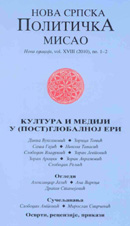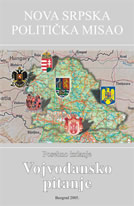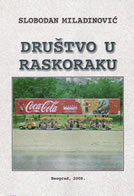| NSPM in English | |||
On Thin Ice |
 |
 |
 |
| четвртак, 14. август 2008. | |
|
The reality is that the United States has only limited leverage in this conflict. True, Washington could, for example, block Russia 's entry into the World Trade Organization, which would deny the country some important economic opportunities. But Russia has some counterleverage at its disposal. Most notably, as a major energy exporter in a world hungry for energy supplies, Russia is not likely to be “isolated,” as some overwrought American hawks demand. One passage in the president's statement is cause for alarm, however. He announced that he was directing Secretary of Defense Robert Gates to execute a “humanitarian mission to the people of Georgia , headed by the United States military.” Bush stated that a C-17 transport plane loaded with humanitarian supplies was already on its way, and that in the days ahead U.S. military aircraft and naval forces would be tasked with delivering aid. That is a reckless move. The supposed cease-fire that was proclaimed on Tuesday seems largely ineffectual. Without a reliable truce in place, U.S. military forces would be entering a volatile war zone. Moreover, there was no indication that Bush was asking the Russians for permission. Indeed, his statement had all the characteristics of a demand—or a dare. “We expect Russia to ensure that all lines of communication and transport, including seaports, airports, roads, and airspace remain open for the delivery of humanitarian assistance.” The arrogance of that position is breathtaking. When a major cyclone created widespread devastation in Burma earlier this year, some proponents of humanitarian aid urged the U.S. military to compel delivery even in the teeth of opposition from the Burmese junta. American leaders rejected their pleas, however, deeming such an operation to be too dangerous. Apparently that situation was considered more dangerous than barging into a war zone where the military forces of a nuclear-armed power are conducting military operations. Washington is creating a situation in which one nervous or trigger-happy Russian soldier could ignite an extremely ugly and perilous confrontation. Indeed, it might not even be a Russian soldier. Military units from Georgia 's secessionist regions of South Ossetia and Abkhazia are operating alongside their Russian allies. The degree of training and discipline of those forces is difficult to determine, but it is likely to be inferior to that of the Russian army. It is not a wild stretch of the imagination to conceive of one of those irregular units not getting the message that it would be a really bad idea to impede the mission of American military personnel. One suspects that the goal of the U.S. venture is not purely humanitarian. The humanitarian justification is likely—at least in part—a cover for an attempt to establish a bridgehead of U.S. military and political influence in Georgia to thwart the advance of Russian power. If so, the Bush administration is taking an extraordinary risk for very limited stakes. There might be some places in the world that are less relevant than Georgia to the security and liberty of the American people, but it would take a concerted search to find them. The conflict in Georgia is a tragedy with murky roots, and one certainly grieves for the innocent people caught up in the violence. But it will solve nothing for the United States to blunder into that conflict. Bush's hasty, intrusive humanitarian-aid mission creates precisely that danger. Ted Galen Carpenter, vice president for defense and foreign-policy studies at the Cato Institute, is the author of eight books on international affairs, including Smart Power: Toward a Prudent Foreign Policy for America (2008). He is also a contributing editor to The National Interest . (14.08.2008 The National Interest) |
Остали чланци у рубрици
- Playing With Fire in Ukraine
- Kosovo as a res extra commercium and the alchemy of colonization
- The Balkans XX years after NATO aggression: the case of the Republic of Srpska – past, present and future
- Из архиве - Remarks Before the Foreign Affairs Committee of the European Parliament
- Dysfunction in the Balkans - Can the Post-Yugoslav Settlement Survive?
- Serbia’s latest would-be savior is a modernizer, a strongman - or both
- Why the Ukraine Crisis Is the West’s Fault
- The Ghosts of World War I Circle over Ukraine
- Nato's action plan in Ukraine is right out of Dr Strangelove
- Why Yanukovych Said No to Europe

.jpg)








 Shortly before noon yesterday, President Bush issued a statement in the Rose Garden about the military conflict between Russia and Georgia. Most of his statement could be classified as wishful thinking and diplomatic posturing. For example, he proclaimed that the United States “stands with the democratically elected government of Georgia”, and that “we insist” that the country's sovereignty and territorial integrity be respected. There were also vague threats that Washington might no longer support Moscow 's bid for integration into important international diplomatic and economic institutions.
Shortly before noon yesterday, President Bush issued a statement in the Rose Garden about the military conflict between Russia and Georgia. Most of his statement could be classified as wishful thinking and diplomatic posturing. For example, he proclaimed that the United States “stands with the democratically elected government of Georgia”, and that “we insist” that the country's sovereignty and territorial integrity be respected. There were also vague threats that Washington might no longer support Moscow 's bid for integration into important international diplomatic and economic institutions. 











